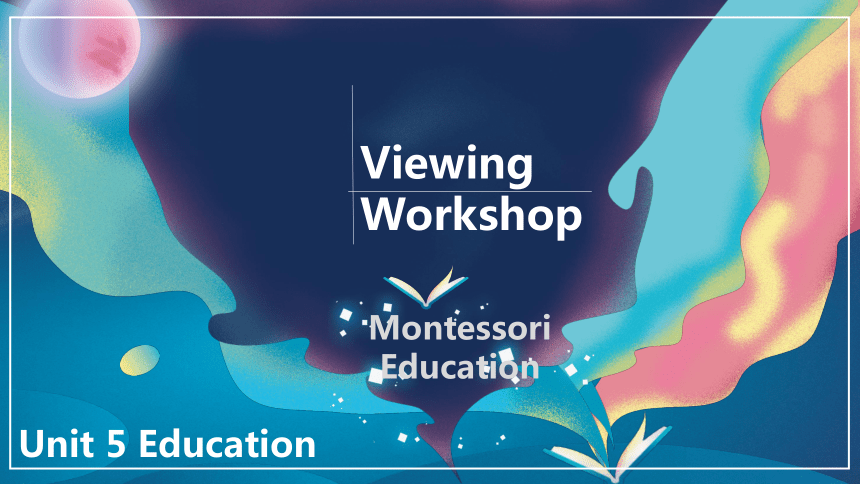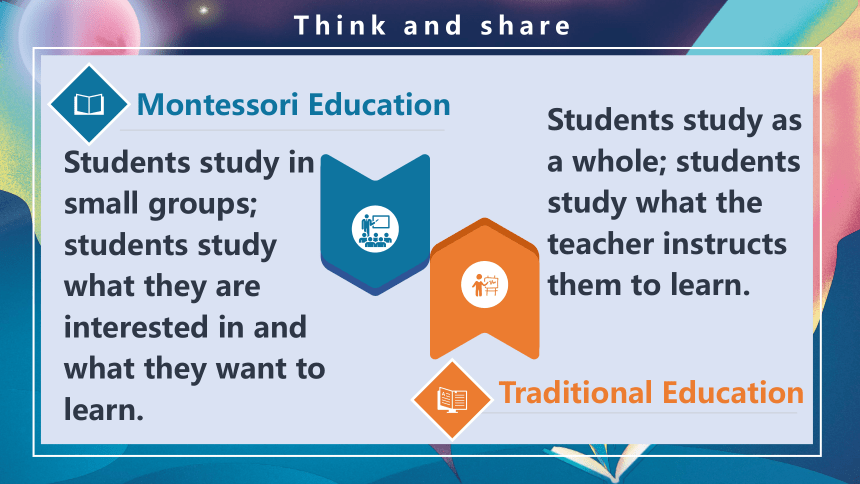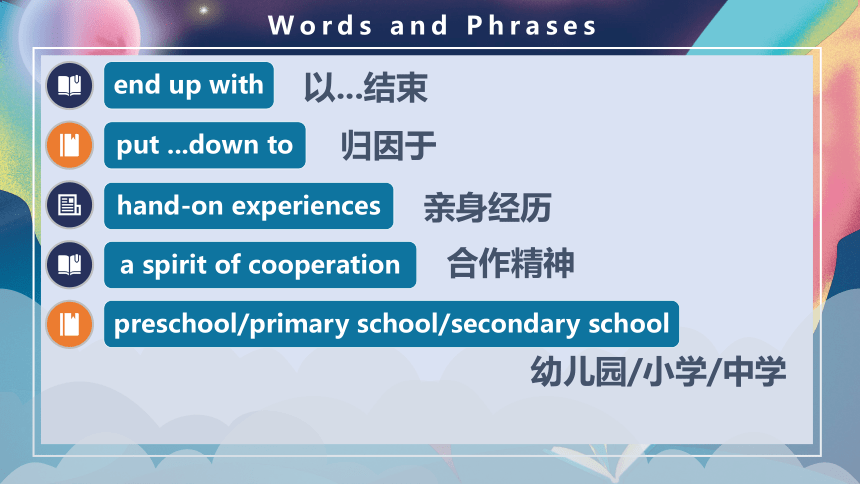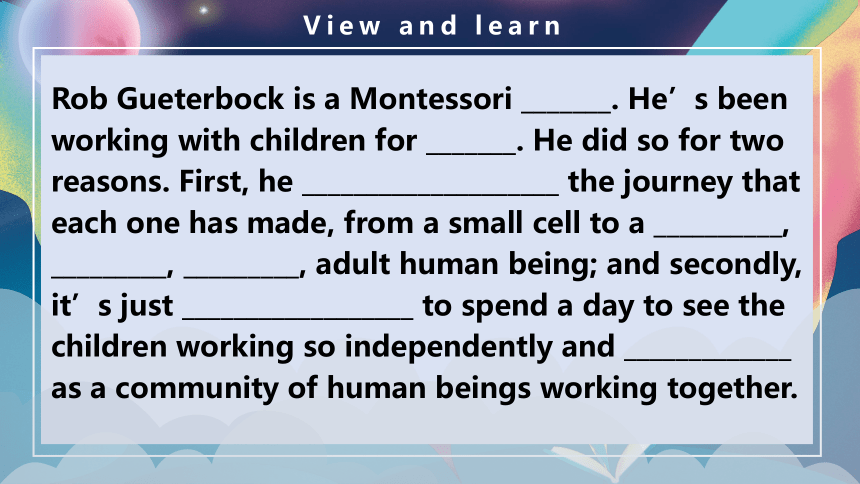Unit 5 Education Viewing Workshop课件(共13张)北师大版(2019)选择性必修第二册
文档属性
| 名称 | Unit 5 Education Viewing Workshop课件(共13张)北师大版(2019)选择性必修第二册 |  | |
| 格式 | pptx | ||
| 文件大小 | 8.5MB | ||
| 资源类型 | 教案 | ||
| 版本资源 | 北师大版(2019) | ||
| 科目 | 英语 | ||
| 更新时间 | 2025-01-08 21:42:29 | ||
图片预览






文档简介
(共13张PPT)
English
2024-2025学年选择性必修第二册
北师大版
Viewing Workshop
Unit 5 Education
Montessori Education
Think and share
Students study in small groups; students study what they are interested in and what they want to learn.
Montessori Education
Students study as a whole; students study what the teacher instructs them to learn.
Traditional Education
guide
be fascinated by
Words and Phrases
be banded by ages
significantly
broad/comprehensive curriculum
向导,指南
对..深深着迷
按年龄划分等级
显著地
综合性的课程
Words and Phrases
a spirit of cooperation
hand-on experiences
put ...down to
preschool/primary school/secondary school
end up with
合作精神
幼儿园/小学/中学
归因于
亲身经历
以...结束
View and learn
Rob Gueterbock is a Montessori _______. He’s been working with children for _______. He did so for two reasons. First, he ____________________ the journey that each one has made, from a small cell to a __________, _________, _________, adult human being; and secondly, it’s just __________________ to spend a day to see the children working so independently and _____________ as a community of human beings working together.
View and learn
View and learn
Rob Gueterbock is a Montessori _______. He’s been working with children for _______. He did so for two reasons. First, he ____________________ the journey that each one has made, from a small cell to a __________, _________, _________, adult human being; and secondly, it’s just __________________ to spend a day to see the children working so independently and _____________ as a community of human beings working together.
guide
7 years
was fascinated by
complex
walking
talking
a beautiful way
functioning
View and learn
Watch Part 2 of the video. Write T (true) or F (false).
( ) 1. Children don’t want to learn by themselves.
( ) 2. Children want to explore the world around them.
( ) 3. Children don’t want to learn things that are told to them.
( ) 4. Children learn best when they’re following their own interests.
( ) 5. Children don’t learn by doing, but by listening or talking.
View and learn
Watch Part 2 of the video. Write T (true) or F (false).
( ) 1. Children don’t want to learn by themselves.
( ) 2. Children want to explore the world around them.
( ) 3. Children don’t want to learn things that are told to them.
( ) 4. Children learn best when they’re following their own interests.
( ) 5. Children don’t learn by doing, but by listening or talking.
F
T
T
T
F
View and learn
Watch Part 3. What are the differences between Montessori education and traditional education
a. Children experience learning at their own pace.
b. Lessons are done in a whole class.
c. Children are banded by age.
d. Children learn in mixed-age communities.
e. Value cooperation.
f. Encourage competition.
g. Lessons tend to be individual or in small groups.
h. They use the word “teacher” instead of “guide”.
i. Teaching begins with a curriculum.
Features
Montessori
Traditional
View and learn
Watch Part 3. What are the differences between Montessori education and traditional education
a. Children experience learning at their own pace.
b. Lessons are done in a whole class.
c. Children are banded by age.
d. Children learn in mixed-age communities.
e. Value cooperation.
f. Encourage competition.
g. Lessons tend to be individual or in small groups.
h. They use the word “teacher” instead of “guide”.
i. Teaching begins with a curriculum.
Features
Montessori
Traditional
a
d
e
g
i
b
c
f
h
i
感谢观看
thank you
English
2024-2025学年选择性必修第二册
北师大版
Viewing Workshop
Unit 5 Education
Montessori Education
Think and share
Students study in small groups; students study what they are interested in and what they want to learn.
Montessori Education
Students study as a whole; students study what the teacher instructs them to learn.
Traditional Education
guide
be fascinated by
Words and Phrases
be banded by ages
significantly
broad/comprehensive curriculum
向导,指南
对..深深着迷
按年龄划分等级
显著地
综合性的课程
Words and Phrases
a spirit of cooperation
hand-on experiences
put ...down to
preschool/primary school/secondary school
end up with
合作精神
幼儿园/小学/中学
归因于
亲身经历
以...结束
View and learn
Rob Gueterbock is a Montessori _______. He’s been working with children for _______. He did so for two reasons. First, he ____________________ the journey that each one has made, from a small cell to a __________, _________, _________, adult human being; and secondly, it’s just __________________ to spend a day to see the children working so independently and _____________ as a community of human beings working together.
View and learn
View and learn
Rob Gueterbock is a Montessori _______. He’s been working with children for _______. He did so for two reasons. First, he ____________________ the journey that each one has made, from a small cell to a __________, _________, _________, adult human being; and secondly, it’s just __________________ to spend a day to see the children working so independently and _____________ as a community of human beings working together.
guide
7 years
was fascinated by
complex
walking
talking
a beautiful way
functioning
View and learn
Watch Part 2 of the video. Write T (true) or F (false).
( ) 1. Children don’t want to learn by themselves.
( ) 2. Children want to explore the world around them.
( ) 3. Children don’t want to learn things that are told to them.
( ) 4. Children learn best when they’re following their own interests.
( ) 5. Children don’t learn by doing, but by listening or talking.
View and learn
Watch Part 2 of the video. Write T (true) or F (false).
( ) 1. Children don’t want to learn by themselves.
( ) 2. Children want to explore the world around them.
( ) 3. Children don’t want to learn things that are told to them.
( ) 4. Children learn best when they’re following their own interests.
( ) 5. Children don’t learn by doing, but by listening or talking.
F
T
T
T
F
View and learn
Watch Part 3. What are the differences between Montessori education and traditional education
a. Children experience learning at their own pace.
b. Lessons are done in a whole class.
c. Children are banded by age.
d. Children learn in mixed-age communities.
e. Value cooperation.
f. Encourage competition.
g. Lessons tend to be individual or in small groups.
h. They use the word “teacher” instead of “guide”.
i. Teaching begins with a curriculum.
Features
Montessori
Traditional
View and learn
Watch Part 3. What are the differences between Montessori education and traditional education
a. Children experience learning at their own pace.
b. Lessons are done in a whole class.
c. Children are banded by age.
d. Children learn in mixed-age communities.
e. Value cooperation.
f. Encourage competition.
g. Lessons tend to be individual or in small groups.
h. They use the word “teacher” instead of “guide”.
i. Teaching begins with a curriculum.
Features
Montessori
Traditional
a
d
e
g
i
b
c
f
h
i
感谢观看
thank you
同课章节目录
- Unit 4 Humour
- Lesson 1 What’s So Funny?
- Lesson 2 Why Do We Need Humour?
- Lesson 3 My Favourite Comedian
- Unit 5 Education
- Lesson 1 Enlightening a Mind
- Lesson 2 The Objectives of Education
- Lesson 3 Understanding
- Unit 6 The Media
- Lesson 1 From Page to Screen
- Lesson 2 Questions about Media
- Lesson 3 The Advertising Game
